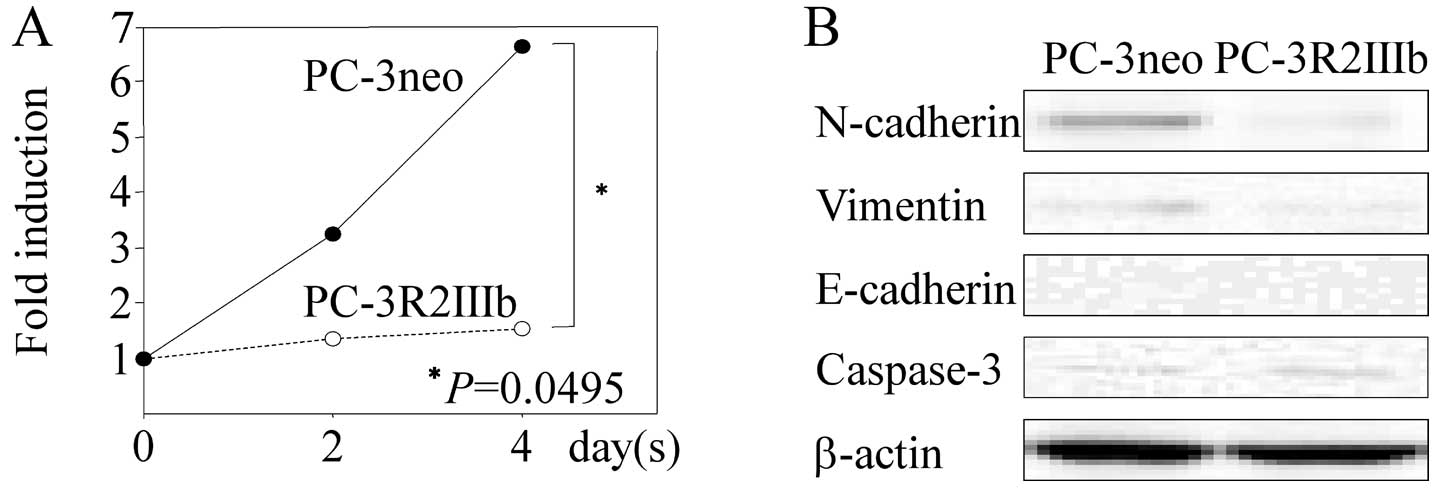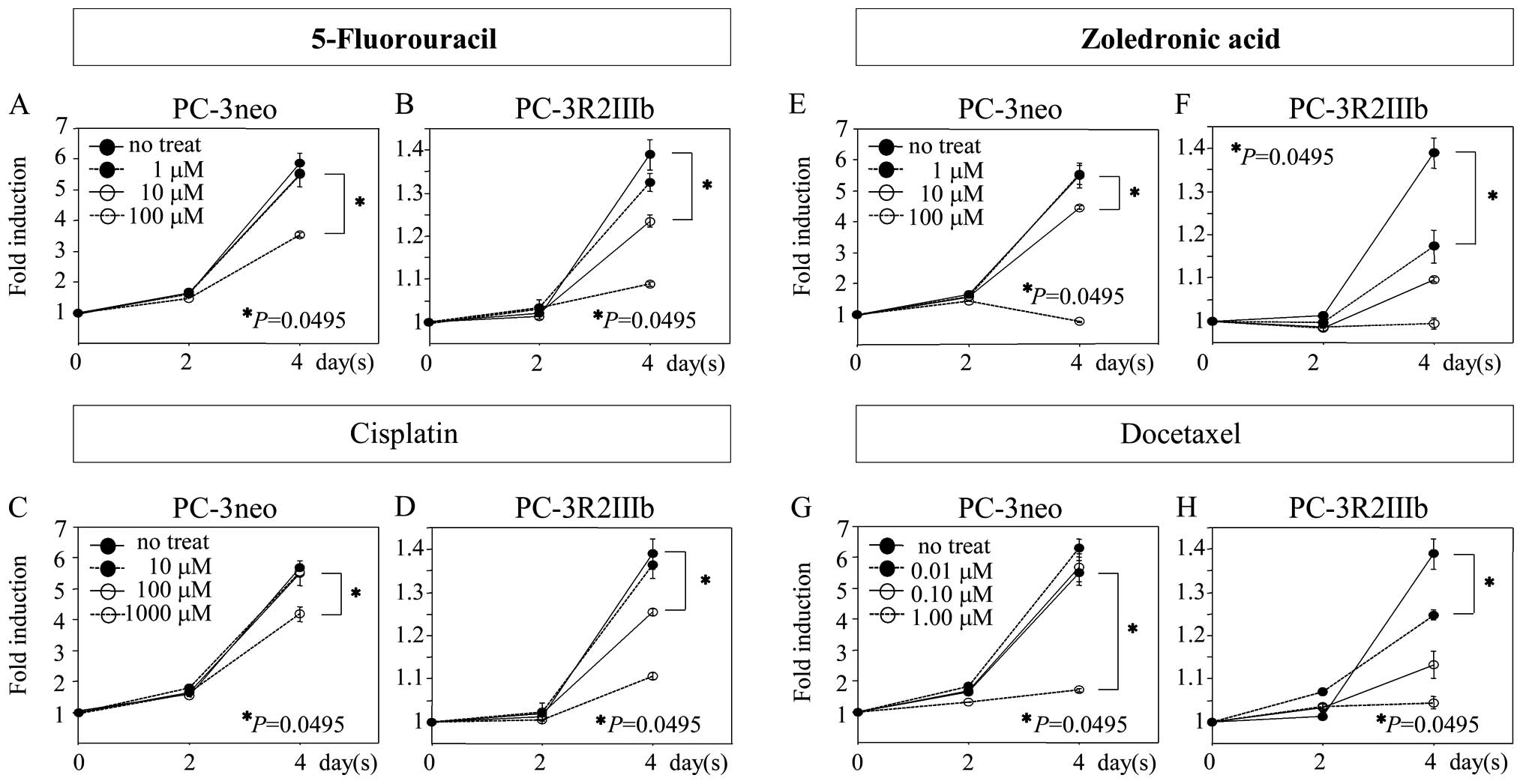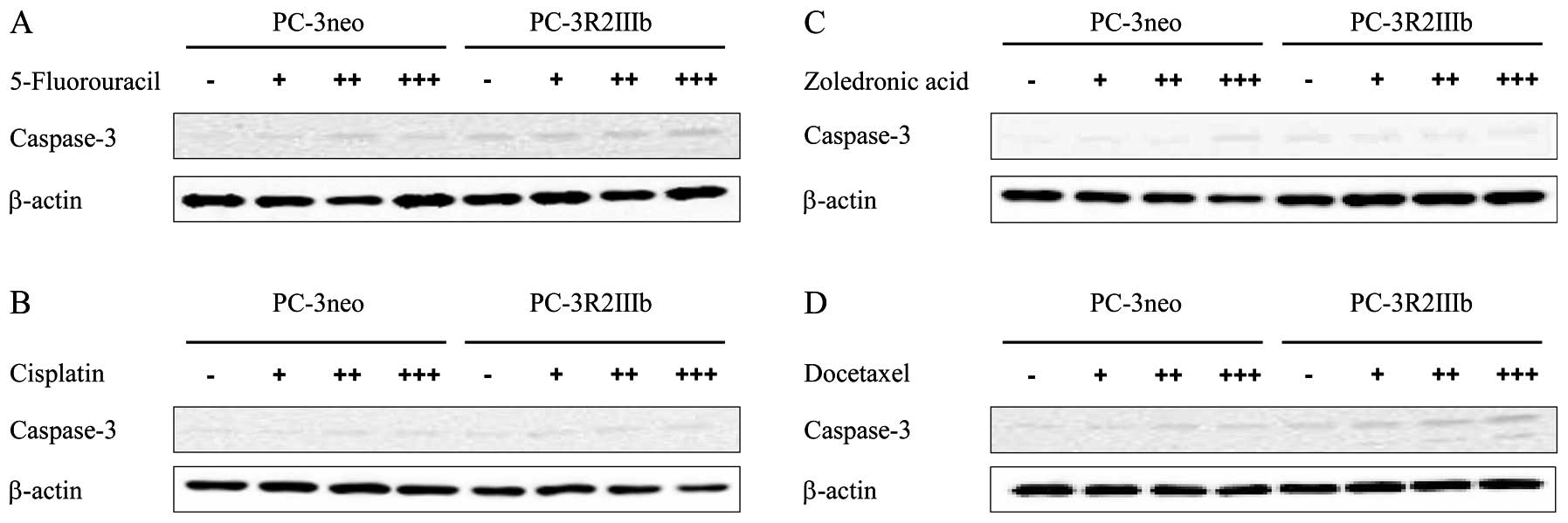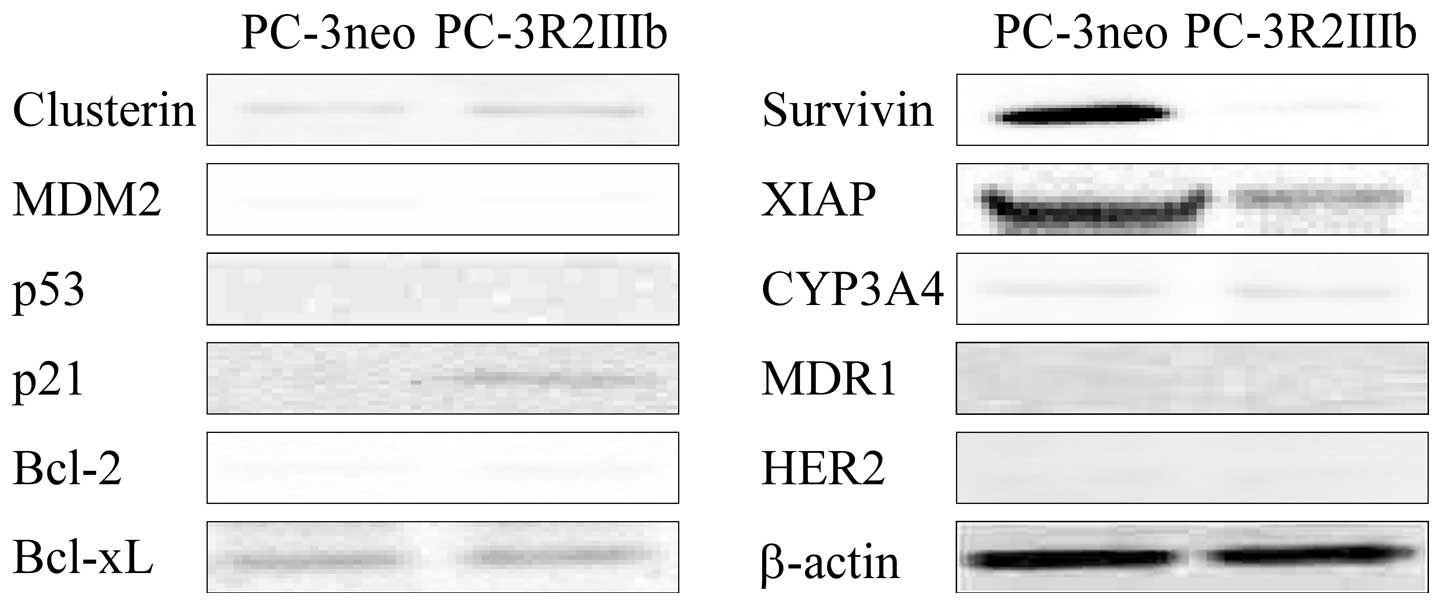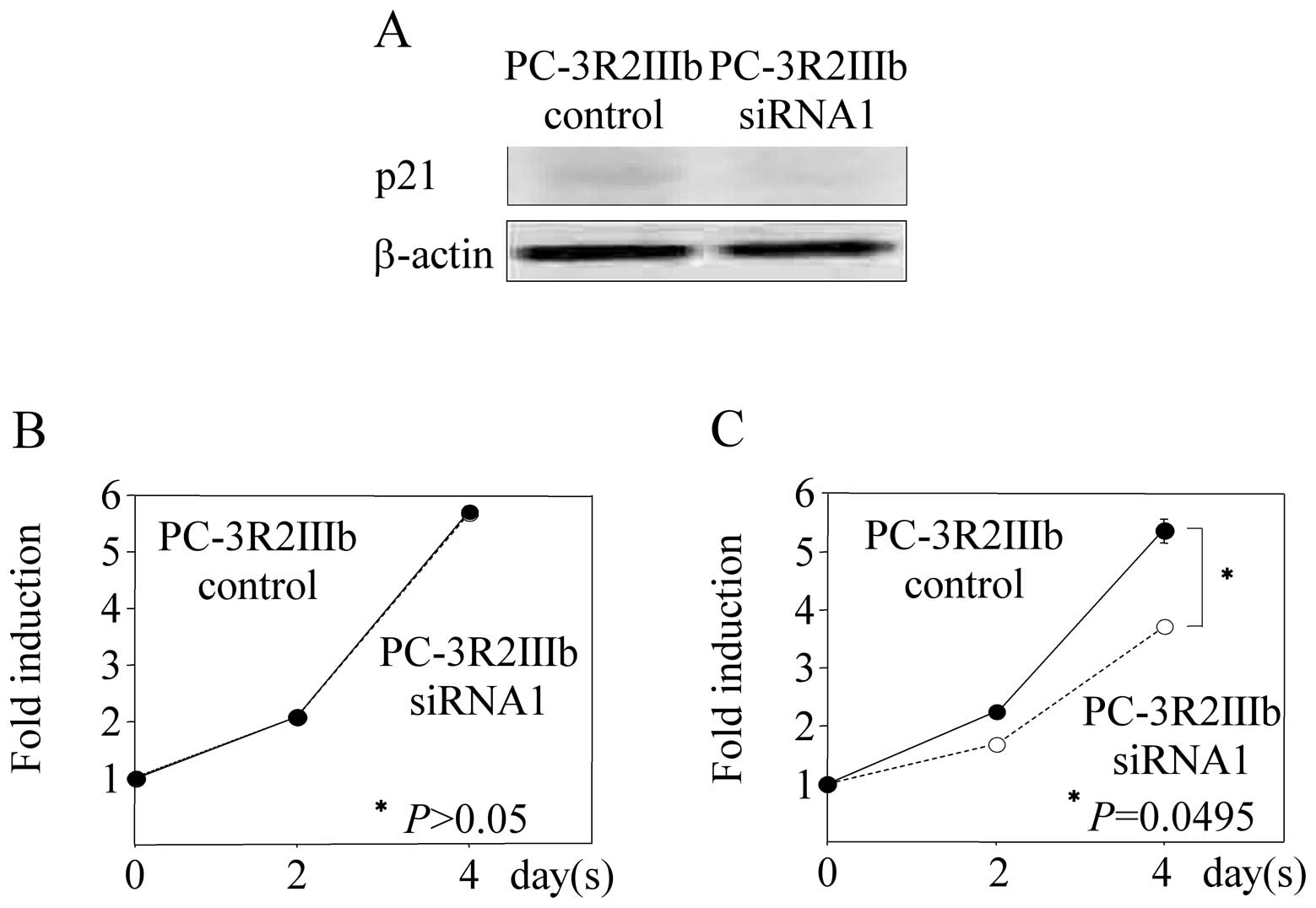|
1
|
Jemal A, Siegel R, Ward E, Murray T, Xu J
and Thun MJ: Cancer statistics, 2007. CA Cancer J Clin. 57:43–66.
2007. View Article : Google Scholar
|
|
2
|
Jemal A, Siegel R, Ward E, et al: Cancer
statistics, 2006. CA Cancer J Clin. 56:106–130. 2006. View Article : Google Scholar
|
|
3
|
Nakata S, Takahashi H, Ohtake N, Takei T
and Yamanaka H: Trends and characteristics in prostate cancer
mortality in Japan. Int J Urol. 7:254–257. 2000. View Article : Google Scholar : PubMed/NCBI
|
|
4
|
Kirby R, Christmas T and Brawer M:
Management of metastatic disease. Prostate Cancer. Hamilton L:
Mosby-Year Book, Inc; St. Louis, MO: pp. 129–141. 1996
|
|
5
|
Tannock IF, de Wit R, Berry WR, et al:
Docetaxel plus prednisone or mitoxantrone plus prednisone for
advanced prostate cancer. N Engl J Med. 351:1502–1512. 2004.
View Article : Google Scholar : PubMed/NCBI
|
|
6
|
Lu W, Luo Y, Kan M and McKeehan WL:
Fibroblast growth factor-10. A second candidate stromal to
epithelial cell andromedin in prostate. J Biol Chem.
274:12827–12834. 1999. View Article : Google Scholar : PubMed/NCBI
|
|
7
|
Sugimura Y, Foster BA, Hom YK, et al:
Keratinocyte growth factor (KGF) can replace testosterone in the
ductal branching morphogenesis of the rat ventral prostate. Int J
Dev Biol. 40:941–951. 1996.PubMed/NCBI
|
|
8
|
Nakano K, Fukabori Y, Itoh N, et al:
Androgen-stimulated human prostate epithelial growth mediated by
stromal-derived fibroblast growth factor-10. Endocr J. 46:405–413.
1999. View Article : Google Scholar : PubMed/NCBI
|
|
9
|
Yan G, Fukabori Y, McBride G,
Nikolaropolous S and McKeehan WL: Exon switching and activation of
stromal and embryonic fibroblast growth factor (FGF)-FGF receptor
genes in prostate epithelial cells accompany stromal independence
and malignancy. Mol Cell Biol. 13:4513–4522. 1993.
|
|
10
|
Naimi B, Latil A, Fournier G, Mangin P,
Cussenot O and Berthon P: Down-regulation of (IIIb) and (IIIc)
isoforms of fibroblast growth factor receptor 2 (FGFR2) is
associated with malignant progression in human prostate. Prostate.
52:245–252. 2002. View Article : Google Scholar : PubMed/NCBI
|
|
11
|
Carstens RP, Eaton JV, Krigman HR, Walther
PJ and Garcia-Blanco MA: Alternative splicing of fibroblast growth
factor receptor 2 (FGF-R2) in human prostate cancer. Oncogene.
15:3059–3065. 1997. View Article : Google Scholar : PubMed/NCBI
|
|
12
|
Werner S, Duan DS, de Vries C, Peters KG,
Johnson DE and Williams LT: Differential splicing in the
extracellular region of fibroblast growth factor receptor 1
generates receptor variants with different ligand-binding
specificities. Mol Cell Biol. 12:82–88. 1992.
|
|
13
|
Kan M, Uematsu F, Wu X and Wang F:
Directional specificity of prostate stromal to epithelial cell
communication via FGF7/FGFR2 is set by cell- and FGFR2
isoform-specific heparan sulfate. In Vitro Cell Dev Biol Anim.
37:575–577. 2001. View Article : Google Scholar : PubMed/NCBI
|
|
14
|
Yan G, Fukabori Y, Nikolaropoulos S, Wang
F and McKeehan WL: Heparin-binding keratinocyte growth factor is a
candidate stromal-to-epithelial-cell andromedin. Mol Endocrinol.
6:2123–2128. 1992.PubMed/NCBI
|
|
15
|
Kwabi-Addo B, Ozen M and Ittmann M: The
role of fibroblast growth factors and their receptors in prostate
cancer. Endocr Relat Cancer. 11:709–724. 2004. View Article : Google Scholar : PubMed/NCBI
|
|
16
|
Fukabori Y, Yan G, Yamanaka H and McKeehan
WL: Rapid induction of keratinocyte growth factor (FGF-7) and
beta-actin after exposure of prostate stromal cells to androgen. In
Vitro Cell Dev Biol Anim. 30A:745–746. 1994. View Article : Google Scholar : PubMed/NCBI
|
|
17
|
Matsubara A, Yasumoto H and Usui T:
Hormone refractory prostate cancer and fibroblast growth factor
receptor. Breast Cancer. 6:320–324. 1999. View Article : Google Scholar : PubMed/NCBI
|
|
18
|
Yasumoto H, Matsubara A, Mutaguchi K, Usui
T and McKeehan WL: Restoration of fibroblast growth factor receptor
2 suppresses growth and tumorigenicity of malignant human prostate
carcinoma PC-3 cells. Prostate. 61:236–242. 2004. View Article : Google Scholar : PubMed/NCBI
|
|
19
|
Matsubara A, Kan M, Feng S and McKeehan
WL: Inhibition of growth of malignant rat prostate tumor cells by
restoration of fibroblast growth factor receptor 2. Cancer Res.
58:1509–1514. 1998.PubMed/NCBI
|
|
20
|
Feng S, Wang F, Matsubara A, Kan M and
McKeehan WL: Fibroblast growth factor receptor 2 limits and
receptor 1 accelerates tumorigenicity of prostate epithelial cells.
Cancer Res. 57:5369–5378. 1997.PubMed/NCBI
|
|
21
|
Polnaszek N, Kwabi-Addo B, Peterson LE, et
al: Fibroblast growth factor 2 promotes tumor progression in an
autochthonous mouse model of prostate cancer. Cancer Res.
63:5754–5760. 2003.PubMed/NCBI
|
|
22
|
Song S, Wientjes MG, Gan Y and Au JL:
Fibroblast growth factors: an epigenetic mechanism of broad
spectrum resistance to anticancer drugs. Proc Natl Acad Sci USA.
97:8658–8663. 2000. View Article : Google Scholar : PubMed/NCBI
|
|
23
|
van Bokhoven A, Varella-Garcia M, Korch C,
et al: Molecular characterization of human prostate carcinoma cell
lines. Prostate. 57:205–225. 2003.PubMed/NCBI
|
|
24
|
Kaighn ME, Narayan KS, Ohnuki Y, Lechner
JF and Jones LW: Establishment and characterization of a human
prostatic carcinoma cell line (PC-3). Invest Urol. 17:16–23.
1979.PubMed/NCBI
|
|
25
|
Lebedeva IV, Sarkar D, Su ZZ, et al: Bcl-2
and Bcl-xL differentially protect human prostate cancer
cells from induction of apoptosis by melanoma differentiation
associated gene-7, mda-7/IL-24. Oncogene. 22:8758–8773.
2003.PubMed/NCBI
|
|
26
|
Liu S, Bishop WR and Liu M: Differential
effects of cell cycle regulatory protein p21WAF1/Cip1 on
apoptosis and sensitivity to cancer chemotherapy. Drug Resist
Updat. 6:183–195. 2003. View Article : Google Scholar : PubMed/NCBI
|
|
27
|
Matsubara A, Teishima J, Mirkhat S, et al:
Restoration of FGF receptor type 2 enhances radiosensitivity of
hormone-refractory human prostate carcinoma PC-3 cells. Anticancer
Res. 28:2141–2146. 2008.PubMed/NCBI
|
|
28
|
Iwatsuki M, Mimori K, Yokobori T, et al:
Epithelial-mesenchymal transition in cancer development and its
clinical significance. Cancer Sci. 101:293–299. 2010. View Article : Google Scholar : PubMed/NCBI
|
|
29
|
Yang H, Li LW, Shi M, et al: In vivo study
of breast carcinoma radiosensitization by targeting eIF4E. Biochem
Biophys Res Commun. 423:878–883. 2012. View Article : Google Scholar : PubMed/NCBI
|
|
30
|
Pienta KJ: Preclinical mechanisms of
action of docetaxel and docetaxel combinations in prostate cancer.
Semin Oncol. 28:3–7. 2001. View Article : Google Scholar : PubMed/NCBI
|
|
31
|
Mahon KL, Henshall SM, Sutherland RL and
Horvath LG: Pathways of chemotherapy resistance in
castration-resistant prostate cancer. Endocr Relat Cancer.
18:R103–R123. 2011. View Article : Google Scholar : PubMed/NCBI
|
|
32
|
Ren J, Chen Y, Song H, Chen L and Wang R:
Inhibition of ZEB1 reverses EMT and chemoresistance in
docetaxel-resistant human lung adenocarcinoma cell line. J Cell
Biochem. 114:1395–1403. 2013. View Article : Google Scholar : PubMed/NCBI
|
|
33
|
Chiou SK, Jones MK and Tarnawski AS:
Survivin - an anti-apoptosis protein: its biological roles and
implications for cancer and beyond. Med Sci Monit. 9:PI25–PI29.
2003.PubMed/NCBI
|
|
34
|
Rahman KM, Banerjee S, Ali S, et al:
3,3′-Diindolylmethane enhances taxotere-induced apoptosis in
hormone-refractory prostate cancer cells through survivin
down-regulation. Cancer Res. 69:4468–4475. 2009.
|
|
35
|
Hayashi N, Asano K, Suzuki H, et al:
Adenoviral infection of survivin antisense sensitizes prostate
cancer cells to etoposide in vivo. Prostate. 65:10–19. 2005.
View Article : Google Scholar : PubMed/NCBI
|
|
36
|
Zhang M, Mukherjee N, Bermudez RS, et al:
Adenovirus-mediated inhibition of survivin expression sensitizes
human prostate cancer cells to paclitaxel in vitro and in vivo.
Prostate. 64:293–302. 2005. View Article : Google Scholar
|
|
37
|
Nomura T, Mimata H, Takeuchi Y, Yamamoto
H, Miyamoto E and Nomura Y: The X-linked inhibitor of apoptosis
protein inhibits taxol-induced apoptosis in LNCaP cells. Urol Res.
31:37–44. 2003.PubMed/NCBI
|
|
38
|
Amantana A, London CA, Iversen PL and Devi
GR: X-linked inhibitor of apoptosis protein inhibition induces
apoptosis and enhances chemotherapy sensitivity in human prostate
cancer cells. Mol Cancer Ther. 3:699–707. 2004.
|















